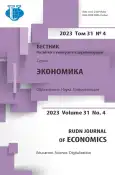High technologies and artificial intelligence as driving factors in the evolution of the world financial and economic architecture
- Autores: Smirnov F.A.1
-
Afiliações:
- World-System Research Center (Think Tank)
- Edição: Volume 31, Nº 4 (2023): EDUCATION. SCIENCE. DIGITALIZATION
- Páginas: 700-711
- Seção: WORLD CAPITAL MARKET
- URL: https://journal-vniispk.ru/2313-2329/article/view/324302
- DOI: https://doi.org/10.22363/2313-2329-2023-31-4-700-711
- EDN: https://elibrary.ru/QEXDYD
- ID: 324302
Citar
Texto integral
Resumo
The current dynamics of the development of the world economy is gaining new momentum despite the high crisis dynamics, containing financial, economic, monetary and geopolitical parameters. The factors accelerating the transformation of the global financial and economic architecture (GFEA) are high technologies, including the digital economy and artificial intelligence. The purpose of the study is to study the dynamics of the development of high technologies and its contribution to the evolution of the global financial and economic system. To conduct this analysis, the work uses a wide range of different scientific methods and approaches - the methodology of system analysis, methods of historical, logical and comparative analysis. Technologies are analyzed according to seven groups of impact on the GFEA transformation process: blockchain technologies, 3D printing, the Internet of Things, mobile broadband, cloud computing, robotics, and artificial intelligence. Their economic contribution to the processes under study is given. The activities of the Singularity University are considered as an example of a transnational think tank engaged in scientific and applied synthesis of high technologies, analysis of their prospects and consequences of their influence on the life of society. Proceeding from this, the contours of the further development of the GFEA and the strategies of behavior in the new conditions are given.
Sobre autores
Fedor Smirnov
World-System Research Center (Think Tank)
Autor responsável pela correspondência
Email: feowelt@gmail.com
ORCID ID: 0000-0001-7321-5414
PhD in Economics, Financial Analyst, Scientific Director.
36 Ostrovityanova St, Moscow, 117647, Russian FederationBibliografia
- Atkinson, R. (2021). A U.S. Grand Strategy for the Global Digital Economy. Retrieved April 10, 2023, from https://itif.org/publications/2021/01/19/us-grand-strategy-global-digitaleconomy/
- Bremmer, I. (2021). The Technopolar Moment. How Digital Powers Will Reshape the Global Order. Foreign Affairs. November/December 2021.
- Dalio, R. (2018). Principles for Navigating Big Debt Crises. Kindle Edition.
- Darby, C., & Sewall, S. (2021). The Innovation Wars. America’s Eroding Technological Advantage. Foreign Affairs, March-April 2021. 142-153.
- Diamandis, P., & Kotler, S. (2016). Bold. How to go Big, Achieve Success, and Impact the World. NY.: Simon & Schuster, Paperbacks, 317 p.
- Duncan, R. (2005). The Dollar Crisis. Causes, consequences, cures. Second edition. Wiley, 324 p.
- Duncan, R. (2022). The Money Revolution. How to Finance the Next American Century. Wiley, 504 p.
- Hall, S., & Li, C. (2021). What is the metaverse? And why should we care? WEF. Retrieved April 10, 2023, from https://www.weforum.org/agenda/2021/10/facebook-meta-what-isthe-metaverse/
- Hongbing Song (2015). War of currencies. Russian choice, 528 p.
- Kurzweil, R., & Grossman, T. (2010). Transcend: Nine Steps to Living Well Forever. Rodale Books, 480 p.
- Mauro, C., Dehghantanha, A., Franke, R., & Watson, S. (2018). Internet of Things security and forensics: Challenges and opportunities. Future Generation Computer Systems, 78(2), 544- 546.
- Mirkin, Y. (2020). Transformation of the Economic and Financial Structures of the World: the Impact of Growing Shocks and Catastrophes. Outlines of Global Transformations. Politics, Economics, Law, 13(4), 97-116. (In Russ.). https://doi.org/10.23932/2542-02402020-13-4-5
- Piketty, T. (2014). Capital in the Twenty-First Century. Éditions du Seuil, Harvard University Press, 696 p.
- Reinhart, C., & Rogoff, K. (2009). This time is different. Eight Centuries of Financial Folly. Princeton University Press, 463 p.
- Rickards, J. (2016). The Road to Ruin. The Global Elites’ Secret Plan for the Next Financial Crisis. UK: Penguin Random House UK, 340 p.
- Ross, A. (2017). The Industries of the Future. Simon & Schuster, 320 p.
- Russell, S., & Norvig, P. (2021). Artificial Intelligence: A Modern Approach, Global Edition 4th Edition. Pearson, 1119 p.
- Schwab, K. (2017). The fourth industrial revolution. Eksmo, 288 p.
- Shiller, R. (2005). Irrational Exuberance. Second edition. New York: Broadway Books, 305 p.
- Siebel, T. (2021). Digital transformation. How to Survive and Succeed in the New Age. Mann, Ivanov and Ferber, 138-139.
- Slaughter, J., & McCormick, H. (2021). Data Is Power. Washington Needs to Craft New Rules for the Digital Age. Foreign Affairs, May-June 2021, 54-62.
- Smirnov, F. (2015). World financial and economic architecture. Deconstruction. Buki Vedi, 568 p.
- Smirnov, F. (2017). Theory of world-system analysis (volumetric parameters). Scientific monograph. People’s education, 158 p.
- Smirnov, F. (2018). Model for Measuring International Processes: The Technology Index and the NBICS+ Technology Group. Journal Auditor, 3(276), 47-54.
Arquivos suplementares









